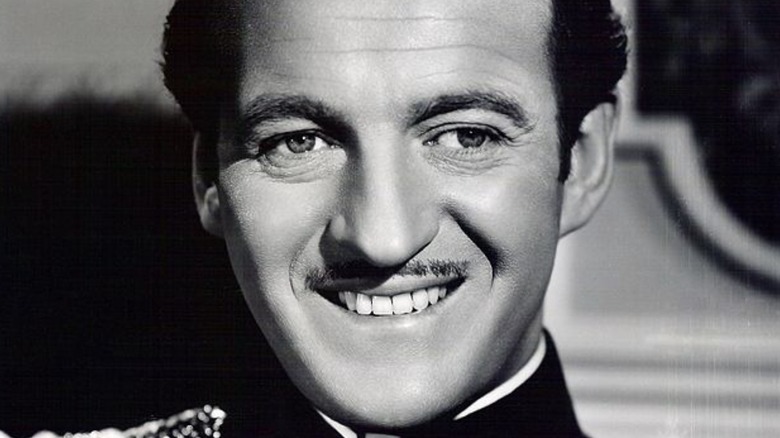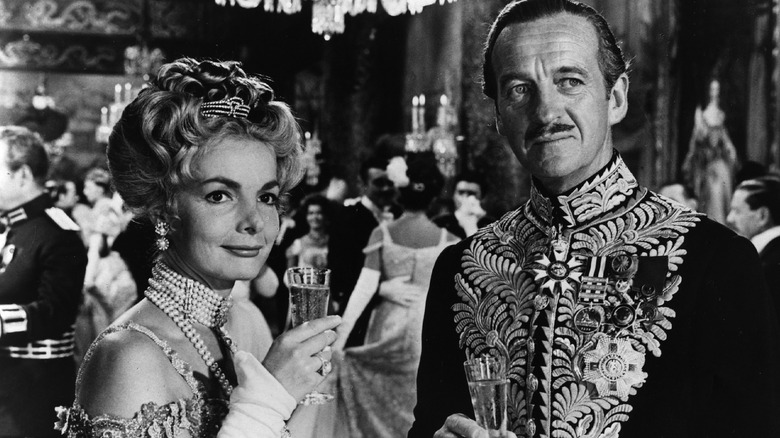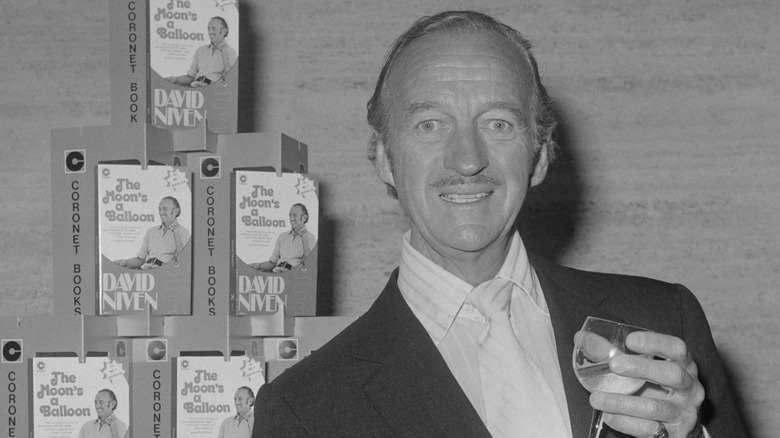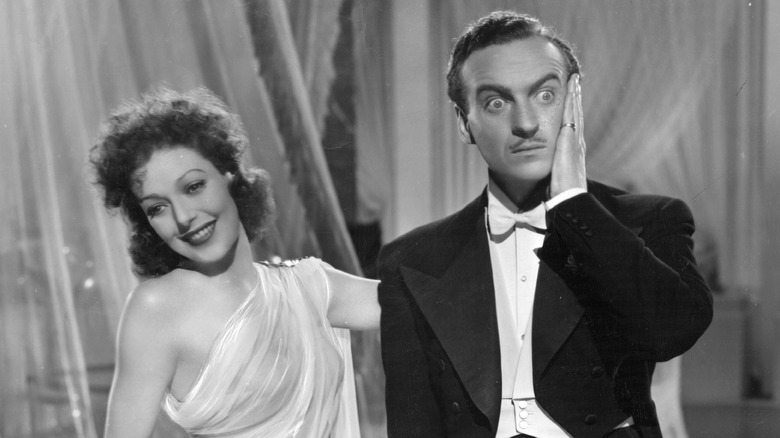The Tragic 1983 Death Of British Acting Icon David Niven
Great Britain has brought the world a wide array of acting talents over the years. From Maggie Smith to Michael Caine, from Richard Harris to Angela Lansbury, a rich vein of dignified acting chops exists in the bedrock of the United Kingdom. David Niven's is a name that would nestle in neatly among any of the nation's drama greats. Per Britannica, he was born in March 1910 in London, and would go on to define himself as a classy British gentleman of the big screen. Despite his movie airs and graces, Niven was certainly not without a sense of humor — he appeared in a number of comedies.
According to Britannica, he graduated from the illustrious Sandhurst Military Academy before embarking on an acting career, following in the footsteps of his father, Lieutenant William Edward Graham Niven (who, per Commonwealth War Graves, was killed during the Gallipoli campaign of World War I). Tragically, the actor himself would also have a heart-wrenching and poignant death.
David Niven served in a World War, just as his father did before him. In the actor's case, it was the Second World War, during which he served (per Britannica) as an officer in a British commando unit. Prior to the outbreak of the war, he had already established himself as a soldier of some repute, earning the rank of lieutenant in January of 1933 (via The London Gazette).
From soldier to actor
It seems clear, however, that the British legend considered himself an actor rather than a soldier. Perhaps he was jaded by the sad, early fate of his father, who was just 37 (per Commonwealth War Graves) when he was killed in action. Of the tragic loss, Niven wrote in his first volume of memoirs, "The Moon's A Balloon," that "my father ... was slaughtered during the war to end all wars ... mother was forced to liquidate."
According to Britannica, Niven began the process of paying his dues as an actor around the time of his promotion to the rank of lieutenant. From smaller roles and bit parts, he emerged as a big name in the likes of "Dawn Patrol," which released in 1938. Prior to that, acting had proven quite a tricky world for Niven to crack. As he writes in "The Moon's A Balloon," his first big studio contract deal was met by the headline "Goldwyn signs unknown!" These early parts weren't the most illustrious.
"My first speaking part was at Paramount in 'Without Regret'" Niven writes. "Elissa Landi was the star and I said 'Goodbye, my dear' to her on a station platform." From these humble beginnings, however, came a wonderful career in the business, though one that would ultimately end in a slow and devastating death.
David Niven was a Hollywood icon
Niven remained debonair, humble and successful throughout his career. When he won his Academy Award for Best Actor for his performance in 1958's "Separate Tables," he was visibly delighted, confessing at the podium (per Oscars on YouTube), "I'm so loaded down with good luck charms I could hardly make it up the steps."
He continued to act and write to the very end, per Britannica, with his novel "Go Slowly, Come Back Quickly" released in 1981 and his final movie appearance, in "The Curse of the Pink Panther," arriving two years later. The year 1983 would also be the year of his death, a sad result of amyotrophic lateral sclerosis, better known as ALS, or Lou Gehrig's disease.
ALS is an enigmatic and insidious disease. As Healthline reports, few cases are genetic, making it difficult to pinpoint a case or risk factor. The devastating effects of the condition, however, are known all too well. Muscle control degenerates as the disease impacts the brain, resulting in difficulty in walking and talking, loss of motor control, involuntary movements, and atrophy of the muscles. It is possible to treat the disease and slow the advance of its symptoms, per Healthline, but it cannot be eradicated and is terminal. Niven's last years were marked by the slow decline characteristic of the disease.
His sense of humor remained
His wife, Hjördis Niven, according to the Express, explained in 1983 that her husband was trying to carefully monitor his own health as the condition took a grip on him. "He'd lost a lot of weight ... he'd been on a very rigid diet he'd devised himself, thinking it would be better for his health." He was, she went on, most troubled by the loss of his speech: "David loves to talk for hours and hours. He still goes on and on except he can only do it in short spurts. That's the thing that annoys him most."
The Express goes on to say that the actor's son, David Jr., was devastated by his father's deterioration. He's reported as saying, "If you love someone, the last thing you want is to see them suffer. For two years he couldn't swallow so he just got thinner and thinner and he couldn't talk." As such, David Jr. considered it something of a blessing that his father died so peacefully, which he did just weeks after Hjördis' words.
Being the class act he was, it's no surprise that David Niven Sr. bowed out with a touch of his trademark sophistication and sense of humor. Per The New York Times, he died on July 29, 1983, in his chalet in Switzerland's Chateau d'Oex. Nephew Michael Wrangdah stated that he "died peacefully and without pain ... his last gesture a few minutes before he died had been to give the thumbs-up sign.”



